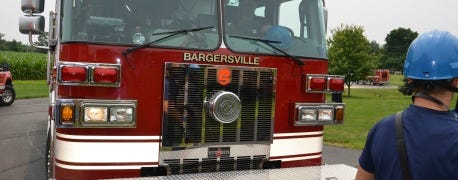
You dial 911 because you need emergency help. The typical response is something like this: “This is the 911 operator. What is your emergency?’ Your reaction is to begin talking quickly; time is of the essence. You may blurt out what happened and where you need help. Hopefully, you hang on, but you may hang up and frantically go to help the victim.
Michael Thompson, a farmer in Alexandria, has learned to ask the 911 operator, or dispatcher, a question before he says what the emergency is about.

WHERE ARE YOU? Michael Thompson says 911 calls, particularly from cellphones, can be routed to the wrong county. To get help quickly, he always asks the dispatcher, “Where are you?”
“It’s very simple,” he says. “I ask them, ‘Where are you?’ It may set them back for a second, but you need to know which 911 dispatcher is on the other end of the line. Is it the dispatcher closest to you, or is it a dispatcher in another county?"
Thompson lives on the Delaware and Madison county line. Many 911 calls go in by cellphone. He is aware of situations where a wreck or accident happened, the people called 911, and the call was routed to the wrong county.
“In one case, the person who wrecked his car was waiting an hour for help, he recalls. The call went to a different county than where the wreck happened.
Related: 8 things farmers need to know when calling 911
Cellphones are routed off various towers, and may not always wind up where you think they would go. In addition, Thompson believes that while, overall, 911 operators do a good job, some aren’t familiar with farming or rural areas, or with the roads in the rural areas where help may be needed.
Bill Field, Purdue University Extension safety specialist, suggests staying on the line with a 911 operator until you see the rescue lights. If an accident happens, the 911 operator is the most important person in your life at that moment. He or she must know where you are.
In responding to Indiana Prairie Farmer about what to do if you must call 911, Thompson wants others to be aware that just because they call 911, they may not be reaching the dispatcher they think they’re reaching. “You need to know who you’re talking to, so you can tell them where you are,” he concludes.
About the Author(s)
You May Also Like




